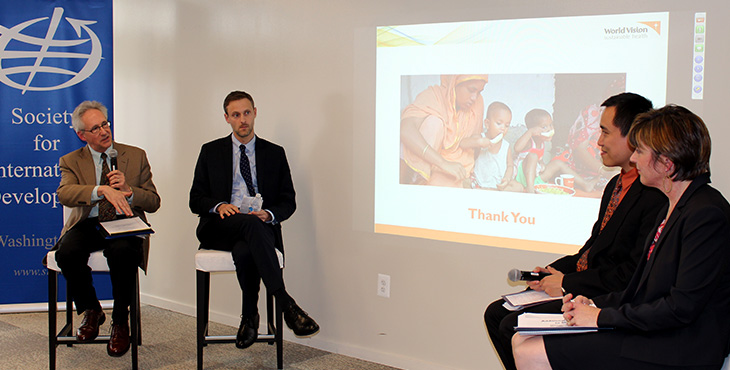The Health Policy Project ended in 2016. Work continued under Health Policy Plus (HP+) until 2022.
NEWS & VIEWS

Derick Brinkerhoff, far left, moderates a forum on health governance for human rights. Left to right are speakers Taylor Williamson, Vy Lam, and Martha Newsome. Photo: Health Policy Project.
April 22, 2015
WASHINGTON, DC—Translating the “right to the highest attainable standard of health”—affirmed and protected by many international agreements—into actionable policies has met significant challenges in many countries. The Washington, DC chapter of the Society for International Development convened a forum titled “Strengthening Health Governance for Human Rights” to explore this topic, both conceptually and through practical examples from the field.
The forum, held at Futures Group, featured presentations by Taylor Williamson, Technical Director for Health Governance at the USAID- and PEPFAR-funded Health Policy Project and Health Governance Specialist at RTI International, and Martha Newsome, Partnership Leader for Sustainable Health at World Vision International. Vy Lam, Democracy Fellow and LGBTI Specialist at USAID’s Center of Excellence on Democracy, Human Rights, and Governance, also spoke. The forum was moderated by Derick Brinkerhoff, Distinguished Fellow in International Public Management, also at RTI.
According to these speakers, access to high-quality health services is out of reach for many people in the developing world. But ensuring the right to health is not just a governmental responsibility, they said. It also requires the concerted efforts of civil society actors to hold the state accountable. Health governance concepts, such as accountability and stewardship, are at the heart of creating these linkages between the state and civil society to protect the right to health.
The speakers offered examples from Ghana, Ethiopia, Uganda, and elsewhere of programs that have successfully used health governance thinking to strengthen the right to health.
Ms. Newsome discussed Citizen Voice and Action, her organization’s approach to community advocacy of the rights to healthcare, education, and other services.
Mr. Williamson described HPP’s work to establish a reporting system overseen by a dedicated health rights staff at Ghana’s Commission on Human Rights and Administrative Justice that tracks cases of discrimination in health services through the courts. The system allows those who file the complaints, as well as human rights and other organizations, to hold courts accountable for enforcing the country’s legal protections.
Both he and Mr. Lam spoke of the special efforts needed to ensure access to health services by people living with HIV and key populations (men who have sex with men, sex workers, transgender people, and people who inject drugs). These groups often experience the most discrimination, and for this and other reasons are marginalized and neglected by healthcare providers. “We’ve seen many achievements in the human right to healthcare,” Mr. Lam said, “but if we ignore key populations, how well are we doing?”
Summarizing the presentations, Suneeta Sharma, HPP’s director, emphasized the importance of local, data-informed initiatives to press governments not only to adopt rights-based health policies but also to operationalize them. Monitoring performance closes the circle from policy to action, she said.
Read more about HPP's work in governance here.
What's New
- Something to Build On: “Innovation Exchange” Celebrates the Health Policy Project’s Close and a New Beginning
- What Will it Take for Tanzania to Achieve ART Targets and Ensure Long-Term Sustainability of the HIV Response?
- Helping Kenya’s County Leaders Advocate for Increased Health Investments
- HPP Holds Working Meeting on Ensuring Responsible PEPFAR Transitions for Key Populations
- Health Policy Project Celebrates 2016 International Women's Day
- HPP Staff Participate in White House Conference on HIV Stigma Reduction

